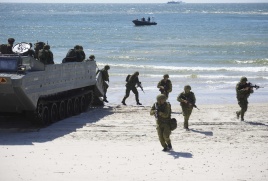VIRGINIA BEACH, Va. — Efforts to enable civil and military forces in globally shared and ungoverned operating areas such as outer space, international waters, airspace and cyberspace have been the subject of a conference here this week featuring insights from key leaders of the Defense Department, U.S. Joint Forces Command and NATO’s Allied Command Transformation.
The three-day Cooperation and Conflict in the Global Commons conference, which concludes today, is sponsored by the Naval Postgraduate School, the National Defense University Institute for National Strategic Studies, Joint Forces Command’s Joint Futures Group and the NATO transformation command.
Kathleen Hicks, deputy undersecretary of defense for strategy, plans and forces, was the conference’s keynote speaker June 29. She highlighted the recent Quadrennial Defense Review’s emphasis on securing the global commons, specifically cyberspace. Attacks there and in the rest of the commons are complex, she said, and identifying the culprit often is difficult. The speed of cyber attacks necessitates fast, agile responses, she added.
“While early warnings against missile attacks or incoming aircraft may allow a few minutes to respond, a computer keystroke travels twice around the world in 300 milliseconds,” Hicks explained. “Our reaction must be even quicker — as close to instantaneous as possible. Attribution of attack — knowing who did what to you — is extremely difficult.” Navy Rear Adm. Lawrence S. Rice, Joint Forces Command’s director of strategy and policy, spoke after Hicks and addressed the fundamental need to secure shared spaces, noting that their crucial role in global trade and information sharing makes them big targets for adversaries.
“We need to address the enemy’s capabilities as they manifest, specifically in the commons,” Rice said. “If those commons are vital connective tissue for trade, then from the enemy’s perspective, threats to the commons have the potential to disrupt the cooperation needed for life here on Earth. We need to make no mistake that risks to the orderly flow of trade and information comprise fundamental national security threats.”
Rice detailed the efforts Joint Forces Command and the Defense Department are making to improve operations in the commons, pointing to the recent standing up of U.S. Cyber Command as an example. He laid out his expectations for the conference.
“We can’t fix something if we don’t know what’s wrong, so we need a clear articulation of the problem statement,” he said. “Following that, we need practical recommendations for how to solve that problem.”
James Soligan, deputy chief of staff for capability development with NATO’s Allied Command Transformation, focused in his remarks yesterday on NATO’s strengths and how they can help to define and solve the complex challenges found in common spaces.
He said NATO’s power is its ability to provide standards accepted by its 28 member nations, which are often adopted globally. NATO also can influence national decisions at a time in which countries have different priorities and fiscal restraints.
“The global commons are so diverse, but the real purpose of the conference is to talk about those common interface mechanisms that allow us to deal with those ungoverned spaces,” he said. “How do we deal with places in which no one nation has territorial responsibilities?”
Results from the conference will be collected and distributed, officials said, to inform forward-looking documents such as Joint Forces Command’s Joint Operating Environment and NATO’s Strategic Concept — as well as operations.
Source:
U.S. Joint Forces Command
U.S. Department of Defense
Office of the Assistant Secretary of Defense (Public Affairs)

 von
von 